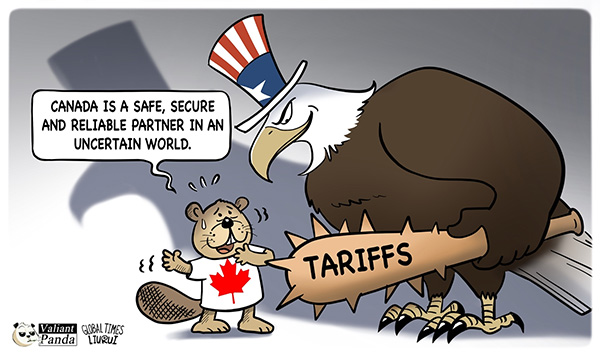
EU membership isn’t on the ballot in Canada’s crucial election later this month — but polling shows Canadians are intrigued by the idea of joining the bloc, POLITICO notes.
As U.S. President Donald Trump upends the relationship with his northern neighbor via a blizzard of punitive tariffs and belligerent social media posts, Canadians are wondering if they should cozy up to new, more reliable allies.
In a recent poll, a whopping 44 percent of Canadians said they supported the idea of EU membership, compared with only 34 percent who dismissed the idea.
European Commission chief spokesperson Paula Pinho noted that Brussels was “honored with the results of such a poll,” but appeared to confirm that only European countries are eligible for membership, according to the bloc’s governing treaties.
But while Canada joining the EU might sound far-fetched even to the Commission, the EU experts who unpacked the question for POLITICO said that although such a gambit would be unlikely to succeed… it’s not actually impossible.
Although separated by the Atlantic Ocean and thousands of kilometers, Canada and the EU share many common interests: strong economic ties, shared democratic values and, well, the splitting headache Donald Trump’s U.S. administration is causing.
That begs the question — given Pinho pointed to terminology in Article 49 of the Treaty on the European Union that says “any European State… may apply to become a member of the Union” — is there anything beyond basic geography that makes a country European and could Canada qualify?
“Being European is more of a state of mind,” Giselle Bosse, professor of EU external democracy support at Maastricht University, told POLITICO.
“Legally and formally a European state is not actually defined and looking into the past, we’ve had European states that in a way are not limited to the European continent,” said Bosse, pointing out that EU countries have overseas territories in the Caribbean, Pacific and the Arctic.
Frank Schimmelfennig, professor of European politics at ETH Zurich, had a similar take, elaborating on an ongoing discussion about what it means to be European beyond placement on a map of the world.
“Canada would certainly qualify,” he said, as it is “in very many ways probably closer to those European values, institutions and policies than many of the current candidate countries.”
Those candidate countries include Western Balkan countries as well as Ukraine and Moldova which are progressing well (if slowly) on the EU pathway, but also Turkey and Georgia, which have stalled due to democratic backsliding and concerns over the rule of law.
Ian Bond, deputy director at the Center for European Reform, believes “it would be extremely difficult to make the case that Canada is a European country” for several reasons.
Even if it were to pass the test of so-called Europeanness, “practical economics” would get in the way, he said.
“Canada would then have to put the customs border between itself and the U.S. and apply EU tariffs and regulations on imports from the US… It would be incredibly economically destructive. It would outweigh any benefits that it might expect to get from the [EU] membership over many, many years,” Bond added.
He said that allowing a new member into the bloc would require unanimity — and even referendums in some member countries, such as France.
“How often have French farmers voted in favor of free trade with other parts of the world? … They are more likely to set things on fire in an effort to prevent it from happening,” he added.
Instead, what Canada could do is improve their economic partnership agreement with the EU, said Bond.
And it seems Canadian authorities are already on that. New Prime Minister Mark Carney made his first foreign trip to France on March 17 to discuss building stronger economic, defense and commercial ties with French President Emmanuel Macron.
But he may have also made a fatal error for any long-shot EU ambitions, when he called Canada the “most European of non-European countries.”
read more in our Telegram-channel https://t.me/The_International_Affairs

 11:47 23.04.2025 •
11:47 23.04.2025 •






















